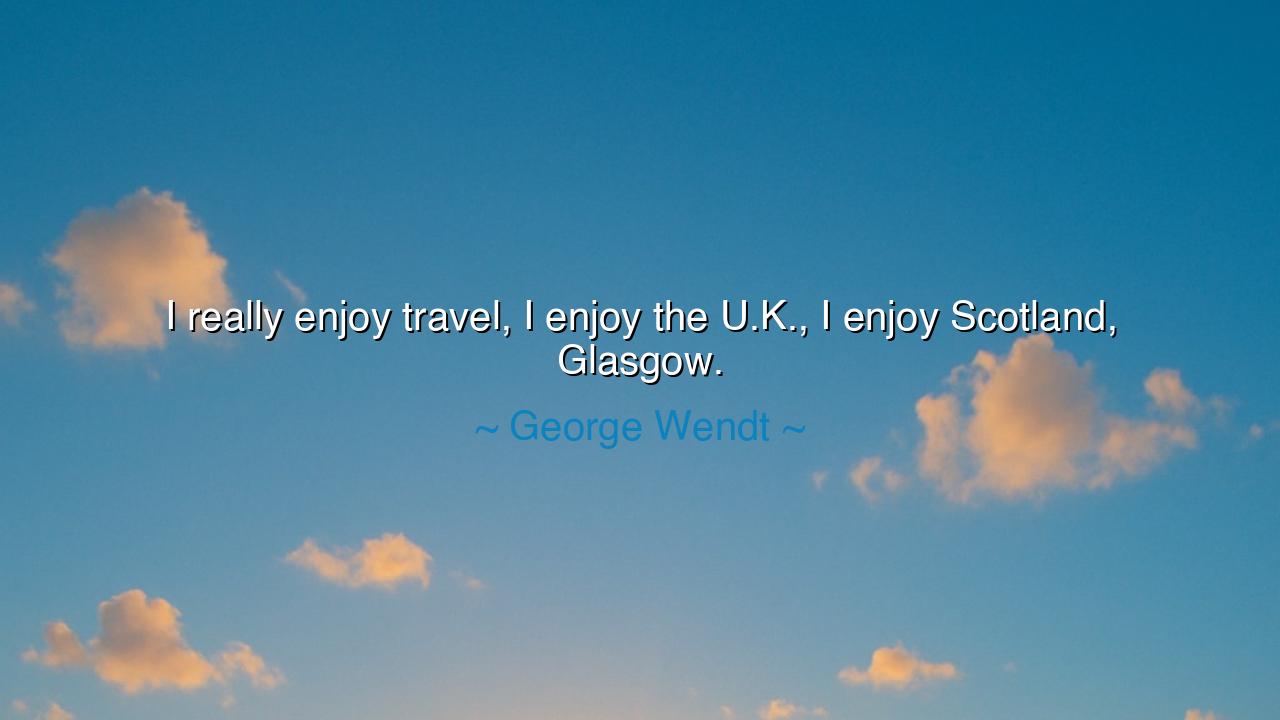
I really enjoy travel, I enjoy the U.K., I enjoy Scotland






Hear the words of George Wendt, who said: “I really enjoy travel, I enjoy the U.K., I enjoy Scotland, Glasgow.” At first glance, these words appear simple, almost casual, the fond recollection of places visited. Yet beneath their plainness lies a truth of profound importance: that joy is found not only in distant wonders or exalted adventures, but in the act of embracing lands, peoples, and cities with gratitude. For to enjoy is no small thing—it is to receive the gift of the world with an open heart, to delight in what lies before us, and to proclaim its worth to others.
To speak of travel with joy is to honor the ancient human instinct to wander. From the dawn of time, our ancestors set out across seas and mountains, not only to conquer or to survive, but to learn and to marvel. Wendt’s words echo this timeless impulse, yet they are free of grandeur: he does not speak of crossing deserts or climbing peaks, but of finding happiness in the streets of Glasgow, in the fields and stones of Scotland, in the rhythms of the U.K. It is a reminder that travel is not always about the extraordinary—it is about the way one chooses to see.
The naming of Scotland and Glasgow carries weight. For Scotland is a land of proud history, where the Highlands whisper of ancient clans, where poets like Robert Burns carved verses into the soul of a nation, and where castles still stand against wind and time. To enjoy such a place is not merely to walk its streets, but to feel its spirit, to honor its resilience, its beauty, and its songs. Glasgow, too, a city once forged in industry, now sings with art, culture, and community. To enjoy it is to see its rebirth, its vitality, and its enduring character.
History shows us that many great men and women found joy in simple travel. Consider Samuel Johnson, who journeyed with James Boswell to Scotland in the eighteenth century. Though Johnson was often critical, even gruff, the journey revealed to him the raw majesty of the land and the dignity of its people. His reflections became part of the fabric of literature, teaching others that to walk among a people is to know them more truly than any book could teach. Wendt’s words are the echo of this same truth: joy comes not from observing at a distance, but from being present and receiving with openness.
The origin of this wisdom lies in humility. Too often, travelers seek to dominate experience, to boast of miles traveled and wonders conquered. But Wendt’s joy is quieter, simpler: the joy of walking, of looking, of appreciating. It reminds us that to truly enjoy a place is not to extract from it trophies or stories, but to let it speak to you, to allow it to shape your memory and soften your spirit. This is why his words, though brief, resound with meaning: enjoyment is itself a noble art, one that many wanderers fail to master.
The deeper meaning is that enjoyment creates connection. When you declare your joy in a place, you honor its people, you acknowledge its worth, and you bridge the distance between yourself and the land. In a world often divided by suspicion and pride, this act of enjoyment becomes a form of peace-making. For who can hate a place they have truly delighted in? Who can despise a people whose hospitality has brought them joy? Wendt’s statement, then, is not just personal—it is universal, a gesture of respect that turns travel into kinship.
The lesson for us is clear: wherever you go, go with the intention not only to see, but to enjoy. Let the streets, the food, the voices, and the landscapes become more than passing sights—let them enter your heart as treasures. Practically, this means traveling with gratitude, speaking well of the places you visit, and resisting the cynicism that seeks only flaws. For in enjoyment lies generosity, and in generosity lies the power to unite.
Therefore, children of tomorrow, remember the wisdom of George Wendt: travel not with pride, but with joy. Celebrate the lands you enter, delight in their people, honor their histories. For to enjoy is to bless, and to bless is to build bonds that outlast borders. In this way, every journey, however simple, becomes an act of reverence, and every city, from Scotland to Glasgow, becomes part of the great story of your heart.






AAdministratorAdministrator
Welcome, honored guests. Please leave a comment, we will respond soon